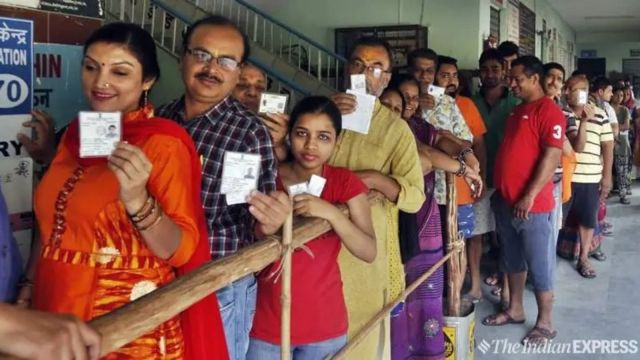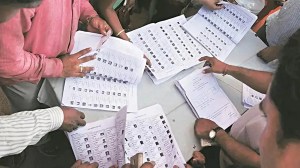Elections in Chandigarh: A ringside view
A closer look at the electoral verdicts reveals following common trends. First, in fifteen Lok Sabha elections held so far in the Union Territory (UT), the Congress and the BJP (earlier Jana Sangh) have won eight and five times respectively. The Janata Party (Jana Sangh being a constituent) and Janata Dal candidates won in the […]
 Proclivity to vote for the party expected to form the government at the Centre is largely due to the ‘satellite’ character of the politics and economy of Chandigarh. (File photo)
Proclivity to vote for the party expected to form the government at the Centre is largely due to the ‘satellite’ character of the politics and economy of Chandigarh. (File photo)A closer look at the electoral verdicts reveals following common trends. First, in fifteen Lok Sabha elections held so far in the Union Territory (UT), the Congress and the BJP (earlier Jana Sangh) have won eight and five times respectively. The Janata Party (Jana Sangh being a constituent) and Janata Dal candidates won in the 1980 and 1989 elections. All the winning and runner up candidates have been from the national parties. The only state party to win ever was the Lok Dal, in alliance with the Janata Party, in the 1977 election. The preference for the national parties can be attributed to the fact that Chandigarh is home to people from all over India. Also, there has been an overwhelming presence of white-collar upper-caste-middle-class citizens, who as surveys show invariably prefer a national party.
Second, being a modern city of the Nehruvian era, Chandigarh has never witnessed elections being contested openly over divisive issues like caste, religion or region. Even the colonies and slum politics remain largely immune from caste and communal politics. Third, Chandigarh despite being the capital of Punjab and Haryana since 1966, the contentious regional issues and party politics related to the two states have hardly had any visible impact on its politics. Also, it is only the ‘national’ and local leaders and not the leaders from two states who campaign, despite the fact that most of these state-level politicians reside in the city.
Fourth, besides the national campaign issues, it is the local issues related to the sectors, colonies and slums of Chandigarh that determine the electoral choices of the electorates. Local issues and candidates play an important role. This may be due to the absence of a legislative assembly in Chandigarh like Puducherry, a long-term local demand. Fifth, scanning the electoral verdicts shows that the party, whose candidate has won in the UT in the past, has formed the government on its own or in coalition at the federal level. The exceptions so far have been the 1967, 1999 and 2024 elections.
Proclivity to vote for the party expected to form the government at the Centre is largely due to the ‘satellite’ character of the politics and economy of Chandigarh. The middle-class voters tend to make a rational choice, that is to be on the right side of the winnable party at the Centre for the sake of the well-being of the city. Sixth, the candidates being put up by parties have invariably been connected with Chandigarh, either as being its residents, have studied in the city’s educational institutions or have spent their early professional life here. Even those who had lived in the city, then moved away to pursue their professional career, carry the burden of being labelled as an outsider.
The 2024 election
Dissecting the verdict in the 2024 elections showed that it confirmed all the above trends. This time, the main contest was again between the candidates belonging to the Congress and BJP, like in the past. The BSP had also put up its own candidate. The AAP, which had an impressive run in the last two elections, this time was backing the Congress. The two main candidates had city connections, with both having houses, schooling and university education here, and being active in student politics due to their political background. Due to the fact that Tewari had moved to Delhi as a practising Supreme Court lawyer, he was dubbed as an outsider by opponents, despite him repeatedly reminding everyone of him being the only (winning) candidate since 1967, who was born in the city. This was one of the factors that was held against him when he wanted the party ticket in the last two elections. Factional politics also thwarted Tandon’s last two attempts to get the party ticket, though he is a city-bred politician.
Like in the past, the BJP tried to whip up support amongst the residents, like in other parts of the country, over national issues like combating corruption, dynastic parties, national security, India being the fifth-largest economy, abrogation of Article 370, Ram Mandir, Vikshit Bharat, and about ‘Modi guaranteed’ schemes for the people living in colonies and slums. Tandon also asked for the vote invoking the leadership of Prime Minister Narendra Modi, though the latter did not address a rally. Tandon also questioned Tewari for frequently shifting his constituencies and doubted his presence in the city after winning.
Tewari, a much more articulate and seasoned orator, being a former national spokesperson of the Congress, harped upon the national as well as local issues. Holding a copy of the Indian Constitution like Rahul Gandhi during campaign meetings, he raised concern about the future of democracy and the need to ensure the institutional well-being. In this context, he repeatedly raised the alleged tampering of votes in the recent election for mayor. He also flagged his experience of being a two-time active member of the parliament and a union minister, contrasting it to the administrative and legislative inexperience of Tandon.
The Congress candidate created an upset, as there was a clear perception, whipped up by the media and the BJP itself, about the party winning parliamentary elections with an overwhelming majority. The middle classes living in sectors were expected to go for the winning party, as has happened in the past. However, this did not happen. Tewari got significant votes from all the sectors, including the posh ones to which he belongs, and in many middle and lower middle class sectors, he actually led. In colonies and villages, Tewari was always expected to have an edge due to the rising prices and lack of employment opportunity, Punjab farmers’ antipathy towards the BJP, which would have an echo in Chandigarh urban villages, suffering from lack of basic civic amenities. Here, the alliance with the AAP also helped as in the past elections, like the one contested in 2014 by the party candidate Gul Panag, again having roots in the city, the party had done exceedingly well. Also, in the local elections held in 2022, the AAP emerged as the largest party.
As for the deep factional politics that prevail in the Chandigarh units of the BJP and Congress, both leaders hardly received much support from other faction leaders. The most important factor that caused the defeat of Tandon was the lack of performance of the former MP from his party. The electors were certainly very unhappy about the overall decline, be it in terms of the IT sector not developing, the corporate sector keeping away, tourism not picking up, traffic woes, civic amenities facilities going down, and bureaucratic inertia in execution of the smart city project, among others. Tandon, being identified with the ruling dispensation, paid the price. Though to his credit, he lost only by a slender margin. Tewari, as an elected representative, would find it difficult to fulfil his poll promises with the BJP-led NDA government being at the centre and their appointed chief administrator at Chandigarh.
(The author is professor of Indian Politics at Panjab University, Chandigarh. The views expressed are personal)







